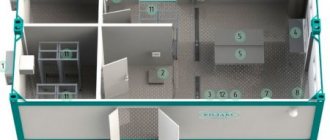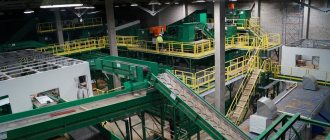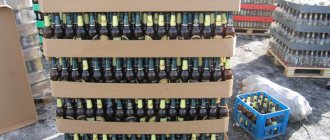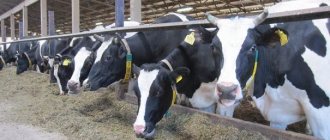Today, the fashion of selling goods through trading machines, which came to us from abroad, is gradually being grafted onto the conditions of our country. What they don’t sell through vending machines: chewing gum, coffee, toys, shoe covers, lottery tickets, lemonade, food (snacks), and so on. And it’s safe to say that the variety of goods sold through vending machines will only continue to grow. In this regard, we offer you an overview of the next creation of the vending market - the milk machine.
Today, the fashion of selling goods through trading machines, which came to us from abroad, is gradually being grafted onto the conditions of our country. What they don’t sell through vending machines: chewing gum, coffee, toys, shoe covers, lottery tickets, lemonade, food (snacks), and so on. And it’s safe to say that the variety of goods sold through vending machines will only continue to grow. In this regard, we offer you an overview of the next creation of the vending market - the milk machine.
A milk dispenser is a vending machine that is used to sell bottled milk without an intermediary (seller).
The price per liter of milk sold through such a machine is lower than the price per liter of packaged milk. For example, in Kazan, a liter of natural bottled milk costs 28 rubles versus 35-40 rubles per liter of pasteurized packaged milk.
Until recently, milk machines were produced only abroad, mostly Italian-made machines. Today, there are models made in Russia in quality that are practically not inferior to their foreign counterparts.
Buyers have no problem using the machine. The sales process is similar to buying coffee: a coin or bill is inserted, the dosage is determined and the container is substituted. The device is capable of giving out change, and starting and stopping the milk supply is done with just one button.
The machine, depending on the model, can hold up to 400 liters of milk. It is equipped with a cooling system that effectively maintains the milk temperature at +4 degrees. The machine also has a convenient function - SMS notification, which will notify the operator that the working tanks have run out of milk. Milk sold through the machine remains fresh for 72 hours.
Milk vending machine filling technology
The technology of filling a milk machine allows you to avoid contact of milk with the external environment. On farms, milk from the milking parlor goes through a milk pipeline into a sealed cooling tank - a milk tank, where it is instantly cooled to a temperature of +4 degrees.
Chilled milk from the milk tank is contactlessly supplied into large containers, which are then hermetically sealed and delivered by isothermal transport to the point of sale.
The main advantages of the milk machine
- The trading process is automatic, so there is no need to hire a salesperson. Thanks to this, the cost is reduced and the price of milk becomes more competitive;
- The trading process through a milk machine located on the street is carried out around the clock;
- A vending machine for selling bottled milk can be placed in many places: shopping centers, bus stops with high traffic, residential areas of the city, etc. The installation area of the machine is only 1-2 m2;
- A milk dispenser is a mobile retail outlet that can be freely moved from an unsuccessful location to a more profitable one;
- The naturalness and environmental friendliness of milk sold through a milk machine increases the demand and popularity of the device among the population.
Milk is supplied to the milk machine directly from the farm. According to experts, fresh milk sold through milk machines is almost the only way for city residents to consume a natural product.
It is more profitable for farmers themselves to sell milk through a vending machine. Why? Because milk is a ready-to-eat product and there is no need to hand it over to processing plants, where the milk goes through the process of pasteurization, sterilization, packaging, etc. By selling milk to processors, the farmer receives a very low margin, but if he sells directly, or in our case through a vending machine, then the profitability of sales increases.
Surely everyone remembers Soviet times, when milk was sold from large barrels, just like kvass is sold today. And that milk was organic, supplied directly from the farm. With the help of a milk machine, you can return natural “homemade” milk to consumers, and entrepreneurs can master a new type of business.
How we organized a business in dairy products (we buy from farmers, sell to stores)
My partner and I organized an LLC specializing in the wholesale trade of dairy products. There was no shortage of suppliers (we work with farmers and small producers). It was not difficult to form an assortment.
Things were more difficult with the search for sales markets. A special feature of our enterprise was the presence of our own refrigerated warehouse and a small fleet of special vehicles.
Dairy products from local farmers include high-quality milk, cottage cheese, cheese, and kefir.
Initial costs were:
- Rental of a refrigerated warehouse and office – 75,000 rubles per month. Expensive, but try to find a specialized warehouse.
- The wage fund for 6 employees, taking into account taxes and contributions to funds, is 550,000 rubles.
- Working capital - 1,500,000 rubles - we took out a loan for turnover (usually these are given only to already operating companies, but we both have a good credit history, the partner already has a company that is serviced by this bank and the company has a closed loan).
The main start-up costs are the purchase of 3 cars with refrigeration units. To save money, cars were purchased on the secondary market, one of them in installments.
We also spent money on a product control system, warehouse accounting, implementation and on a consultant who helped get everything up and running and arrange control over the freshness of products, over the correct organization of purchases and sales. We hired a person from the management of a large retail chain, and later he helped us locate in their stores and gave us many useful contacts. Initially, the focus was on selling dairy products through retail stores within walking distance. At the same time, the problem of small orders came to light.
Small stores often do not have good traffic, and therefore a one-time supply request ranged from 10 to 40 items worth from 200 to 2,000 rubles. Under these conditions, taking into account in-house delivery, the profitability of sales was greatly reduced. But two of our sales representatives constantly travel around the city and region - making deliveries - this is income that cannot be refused.
The situation was different with retail chains. After the start of deliveries to hypermarkets and supermarkets, sales volume increased significantly. However, when concluding contracts, additional costs arose.
Costs associated with meeting the requirements of retail chains for certification of warehouse premises and vehicles. In addition, retail chains carry out their own promotions, a significant part of which is paid for by the supplier, by reducing prices for the period of the promotion. Well, the costs to get space on the shelf.
After a year of operation, cash turnover is 2,500,000 per month. Now we are thinking about product branding and have rented another warehouse where we purchase equipment ourselves.
There is no profit yet (we receive a salary), or rather there is a profit, but in order to withdraw this money, we need to stop developing, but for now we are investing in new points of sale, in a new warehouse, in corporate design, we are working on the brand, including even materials for decorating display cases with our products.
We are thinking about our own production of some products, and there are plans to experimentally install several vending machines.
Competition is high. There are plenty of local brands in this niche; small manufacturers themselves enter the outlets, bypassing intermediaries. The weather is mainly produced by large companies, however, among some of the population local products are in demand, it is believed that they are environmentally cleaner and healthier.
Interesting:
- How to open a business without money - is business possible...
- Winter business ideas: what business to open in winter
- Your own business or work for your uncle? Own business…
- Business ideas with minimal investment, business ideas...
- How I opened my paintball club, and how it is...
- Roadside cafe as a business - ideas on how to make it...
This publication is the story of a novice businessman - share yours!
Author of the post: Alex Hodinar and editors Internet marketing and investment specialist.
Disadvantages of a bottled milk business
One of the main disadvantages, which does not yet allow this business to become widespread, is the price of the milk machine. On average, the cost of a new milk machine ranges from 450 thousand rubles. up to 1.5 million rubles.
One milk machine is not a business; you need to build a network of milk machines at once, and this is already several million starting investments. With a high entrance ticket and little studied demand, it is difficult for an entrepreneur or investor to determine the profitability and expected payback of a project.
Where to start opening a business
If you want to open your own business related to the sale of bottled milk, then you need to take care of many nuances. First of all, you need to find a place where you plan to sell milk on tap in the future. Since this product needs to be stored somewhere in large quantities, make sure to buy a huge barrel.
After that, find suppliers who will bring you a quality dairy product. At the last stage, you should register the business and find a seller if you do not want to handle the spill yourself.
Menu
There have been more frequent requests from the population to the trade department of the district administration regarding unauthorized trade in milk and its processed products, the sale of which on the street is strictly prohibited (Law of the Saratov Region of July 29, 2009 No. 104-300 “On Administrative Offenses in the Saratov Region”).
But, despite the prohibitions, homemade “milk” is sold at crossroads, near shops, in the courtyards of high-rise buildings - in unsanitary conditions, in the absence of documents certifying the quality and safety of the products. Milk traders usually give milk to potential buyers from the caps of plastic bottles. Before you try this milk, think about it: who before you tried this “dish” today?
The origin and quality of milk and dairy products sold by private traders is questionable - their production and storage are practically uncontrolled, and they can cause mass food poisoning and lead to the spread of infectious diseases (brucellosis, salmonellosis, tuberculosis and others).
Permitted trade is carried out only in markets where there are specially equipped pavilions, quality control is carried out, and research is carried out in veterinary and sanitary examination laboratories.
Understanding the danger spontaneous trade poses to the population, the district administration is taking appropriate measures, conducting raids with the participation of representatives of the territorial department of Rospotrebnadzor for the Marksovsky district, the veterinary department of the Regional Government, specialists from the department of economic development and trade and the local police commissioner. Two citizens were brought to administrative responsibility, work in this direction continues.
Please report any cases of unauthorized sale of dairy products by phone:
- (84 567) 5−16−89 - this is the department for trade and labor relations of the administration of economic development and trade administration;
- (84 567) 5−16−97, (84 567) 5−04−07 - this is a group for the implementation of administrative legislation of the department of the Ministry of Internal Affairs of Russia for the Marksovsky district;
What is brucellosis
A person becomes infected with brucellosis through raw cow, goat, sheep milk and dairy products affected by the pathogen, and the meat of sick animals. People's natural susceptibility is high and is not determined by gender or age. With brucellosis, joints, blood vessels, and the peripheral nervous system are most often affected, the psyche changes, and the disease often ends in disability. When boiled, brucellae die. But it is impossible to heat treat cheese, cottage cheese, and sour cream. Brucella remains in these products throughout their entire shelf life. In feta cheese this period reaches 30-40 days.
Source: Volozhka newspaper.
How much money do you need to start?
To start a business selling bottled milk, you must have initial capital, which will depend on the following elements:
- 2-10 thousand rubles. – renting a place, depending on which area you choose;
- 15 thousand rubles. — device maintenance;
- the cost of transporting milk will depend on the distance over which you will transport it;
- payment of taxes in the amount of 6-20% depending on the choice of taxation system;
- 1-5 thousand rubles. – advertising;
- 10-15 thousand rubles. – purchase of a dairy product that will be sold in the future.
Risks and disadvantages of business
There are several risks associated with starting a business:
- lack of the required number of buyers and the presence of milk residues after sale;
- wrong choice of place of trade;
- low-quality product that has not passed sanitary inspection.
Despite the possible risks, starting a business selling milk from a barrel will be an excellent source of income, and the profit received will allow you to recoup your investment in a fairly short time. In the future, you can expand your activities and purchase another tank.











